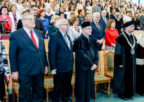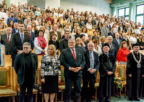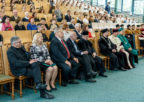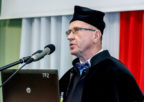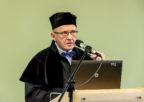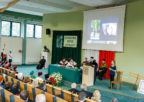On September 28, on the occasion of opening ceremony of the academic year 2018/2019, Prof. Henryk Skarżyński delivered a keynote lecture, at the M. Grzegorzewska Academy of Special Education (APS) in Warsaw, entitled: “Hearing in Human Development”. It is worth mentioning that in 2011, APS awarded to Prof. Henryk Skarżyński the honoris causa degree.
The celebration was also honored with the presence of: Paweł Kotarek, Advisor to the Minister of Science and Higher Education, Prof. Zbigniew Marciniak, Chairman of the General Council for Science and Higher Education, Prof. Tomasz Borecki, Director of the Institute of Contemporary Civilization Problems, Prof. Tomasz Szapiro, former Rector of SGH (Warsaw School of Economics), Prof. Joanna Madalińska-Michalak, Chairwoman of the Polish Pedagogical Society, Prof. Alicja Siemak-Tylikowska of the Warsaw University, Włodzimierz Paszyński, Vice-President of Warsaw, Dorota Skrzypek, Mazovian Deputy Education Officer, Walentyna Rakiel-Czarnecka, representative of the Governor of the Mazovian Voivodship – Adam Struzik, Dorota Habich, President of the Board of the State Fund for Rehabilitation of the Disabled (PFRON), Adam Marcin Zakrzewski, Director of the Independent Complex of Public Health Care Institutions Warszawa-Ochota, Prof. Jadwiga Frelek, Prof. Bogusław Milerski, Rector of Christian Theological Academy in Warsaw, Rev. Prof. Krzysztof Pawlina, Rector of the Pontifical Faculty of Theology in Warsaw, Prof. Krzysztof Lewenstein, Vice-Rector for Science of the Warsaw University of Technology, Prof. Hanna Godlewska-Majkowska, Vice-Rector for Cooperation with Local Community of the Warsaw School of Economics, Prof. Anna Fidelus, Vice-Rector for Student Matters and Education of the Cardinal Stefan Wyszyński University, Prof. Michał Zasada, Vice-Rector for International Cooperation of the Warsaw University of Life Sciences (SGGW), Prof. Waldemar Raźniak, Vice-Rector of A. Zelwerowicz Theatre Academy in Warsaw, Prof. Monika Gruszkowska, Vice-Rector for Scientific Research and Implementation of the Academy of Physical Education, Prof. Grzegorz Sędek, Vice-Rector for Science of SWPS University of Social Sciences and Humanities, Prof. Kazimierz Przybysz, Vice-Rector for Program Delivery at Koźmiński University, Prof. Zdzisław Bohdanowicz, Vice-Rector for Education of the Military University of Technology, Prof. Robert Żak, Vice-Rector for Program Delivery of P. Włodkowic University College in Płock, Prof. Mirosław Minkina,Vice-Rector for Science of the University of Natural Sciences and Humanities in Siedlce, mł. bryg. dr inż. Anna Prędecka, Dean of Civil Safety Engineering Faculty of the Main School of Fire Service, Dr. Małgorzata Cieciora, Dean of the Information Management Department of the Polish-Japanese Academy of Information Technology, Prof. Karol Poznański, former Rector of APS, Prof. Jan Łaszczyk, former Rector of APS, Barbara Sochal, President of the J. Korczak Association of Poland, Elżbieta Oleksiak, Secretary of the Consultation Team and Head of the Rehabilitation Center in the Office of the Main Board of the Polish Association of the Blind, Magdalena Piotrowska, Director of the Warsaw Center of “Children’s University” Foundation , Aleksandra Szewczyk from “Zdążyć z pomocą” Foundation and Olimpia Rumanowska-Zapiór, Director of the Psychological and Pedagogical Counselling Center No. 21 in Warsaw. The guests were welcomed by Prof. Stefan Kwiatkowski – Rector of the Academy.
In his keynote lecture Prof. Henryk Skarżyński repeatedly emphasized that communication, access to information and its exchange are one of the foundations for the development of modern society. While at the beginning of the 20th century, more than 90% of the human operations and their position in the society were determined by manual skills, now the ability to communicate, in about 90%, is of the primary importance. Good hearing is essential to it. We still remember Seneca’s words “It’s not good to see everything, it’s not good to hear everything”. However, medicine does everything to help thousands and even millions of people who, due to various types of hearing loss, cannot function normally in the modern world.
Prof. Skarżyński devoted much space of his lecture to the latest technologies in the treatment of partial deafness, music therapy and diagnostics in the Sensory Examination Capsule – the world’s first mobile device that allows the patient to self-check 5 senses: hearing, vision, smell, taste and balance, as well as speech and auditory processing. This innovative health control system, enabling simultaneous diagnostics and analysis of senses disorders, allows to examine quickly and painlessly each volunteer.
– Until now, to diagnose individual organs, patients had to visit several specialized centers. – said Prof. Skarżyński, at the beginning of his lecture, – giving them opportunity to do this in one place, for example, during shopping in a shopping center, may disseminate screening tests, form pro-health attitudes and build intergenerational solidarity, which we deeply care about.
The implementation of this project required us to thoroughly review our current knowledge on the diagnostic and therapeutic methods and devices used for patients with such disorders. This meant a lot of work, but above all, a great scientific challenge, because at present there is no other system of devices in the world, which enables you to do a single examination of all senses and speech organs. This system enables taking early interventions, detection of neurodegenerative diseases in aging societies and allows to build the state health policy on the results of preventive population tests. All research and scientific projects conducted by us are aimed primarily at improving the quality of life and health of the society. – added Prof. Skarżyński.
The percentage of patients suffering from diseases of sensory organs is increasing, both among children and in the group of seniors. Undetected and untreated disorders in children hinder their development, and in the age group of over 65 they are one of the main causes of social and professional exclusion. Yet, there is a chance that the new device will solve these problems to a large extent. Thanks to ICT solutions, it will be possible to collect all the research results performed in each Capsule and process them in an integrated manner, so it would be easy to draw conclusions about many neurodegenerative diseases, which we can diagnose.
To conclude his lecture Prof. Henryk Skarżyński also presented the latest achievements of the Institute of Physiology of Pathology of Hearing of the World Hearing Center, managed by him. Nowadays the Center and “Polish school of otosurgery ” created by Prof. Skarżyński are a recognizable brand in the world and a showcase of Polish science and medicine in the world. For 15 years, the largest in the world number of operations to improve the hearing have been carried out in Kajetany. Many surgeries have been performed here for the first time in the world. The Center’s specialists are pioneers in the various auditory implants for new groups of patients. In Kajetany the world’s first National Teleaudiology Network has been devised and launched, and innovative telemedicine tools are being developed. The Center is also a unique teaching and research center. It conducts extensive scientific, clinical and teaching cooperation with dozens of countries around the world. Pioneer screening programs for early detection of hearing impairments are carried out on four continents.






